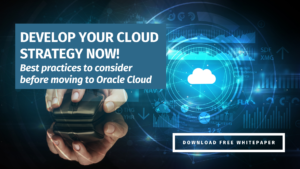There are some foundational challenges that arise when adopting cloud into your business and IT environment. These include:
- The larger the organisation, the more complexity cloud adoption creates. This can be due to the siloed nature of the infrastructure within the existing IT environment, or of newly acquired technologies being put in place. The culture of the organisation may mean it is resistant to change, seeing new adoptions of technology as a threat to the way things have always been done. If there is a lack of readiness for cloud adoption internally, there may be some work to do to get the key stakeholders and their employees onboarded appropriately. Trust can be a significant factor when it comes to cloud providers, and risk averse cultures may come up against this challenge.
- IT leaders may feel locked into particular cloud providers. Some IT leaders may experience a lack of flexibility around transferring workloads to other technologies, applications or environments. Similarly, complexities around pricing and ongoing costs can cause issues for IT and finance teams alike. If the provider isn’t up front with their ongoing costs and fails to notify its customers appropriately, this could cause friction in the longevity of use of that provider. Managing cloud spending is one of the most common challenges when it comes to cloud migration.
- Assumptions that cloud platform providers take on the majority of responsibility for security. It has been common for CIO’s and IT leaders to believe that cloud companies have not traditionally taken on enough of the security responsibility, leaving organisations in the dark around effective protection of their cloud environments. Similarly, some cloud providers have been known to have misconfigured controls that inconsistently alert customers of security or data breaches.
- Understanding how customer data is used is an ongoing concern for many cloud platform customers. Many organisations have very little understanding of how their data is being used and this gap in insight can give customers a lack of confidence in transferring mission-critical data and workloads into new cloud environments.
What cloud solution is best for a mid-sized organisation?
The advancement of technology, storage, and processing power has led to the embodiment of cloud computing and its expanding popularity across various industries for essential business support functions. The long and costly process of buying servers, installations, licenses, and hardware is now being replaced by newer more refined technologies that revolve around the cloud. Additionally, the growth of big data cloud computing and cloud data storage has been a huge facilitator in the rise of cloud computing.
Pivoting to the cloud can be a big challenge. That is why the platform you choose will be an important decision that will potentially affect short and long-term business goals. With the cloud computing market growing at an aggressive rate, vendors such as IBM, Google, Oracle, and Amazon have been catching up fast.
Although Oracle is a late entrant, launching their first IaaS offering in 2015, it has brought a very robust infrastructure to compete with other market players which makes it a technology of choice for small to medium and mid-sized businesses.
Why choose Oracle Cloud over other vendors?
Oracle Cloud is a cloud computing service that combines Infrastructure as a Service (IaaS), Software as a Service (SaaS), Platform as a Service (PaaS), and Data as a Service (DaaS) solutions within Oracle’s cloud infrastructure.
Aside from offering an all-in-one hosted platform for data, applications and infrastructure, Oracle offers a comprehensive suite of business benefits including:
- Lower costs: Oracle Cloud can dramatically reduce expenses, especially when it comes to hardware, maintenance, and IT. Businesses can also leverage cloud versions of their legacy Oracle CX and ERP offerings.
- Agility: Oracle Cloud gives organisations the flexibility to respond quickly and easily to changing industry conditions, emerging technologies, and customer demands. This ensures that legacy infrastructure and applications do not hinder growth or innovation.
- Scalability: With Oracle Cloud businesses do not worry about outgrowing their technology. All solution components have built-in scalability that’s been tested in extreme scenarios.
- Higher security: Oracle Cloud is designed for maximum security and reduced risk – the reduction of custom code and secure application and infrastructure design ensures the protection of the perimeter 24/7. Oracle Cloud is also certified with leading security standards, and provides compliance for region specific compliance as well as regulatory requirements as well.



